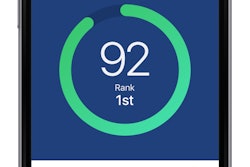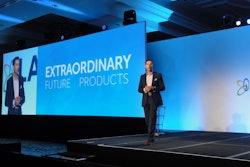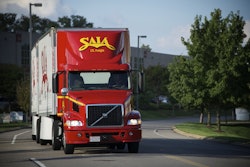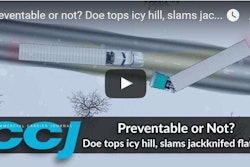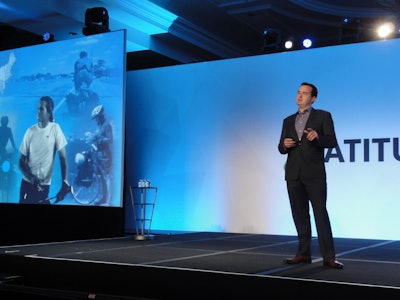 Newth Morris, president and co-founder of Telogis
Newth Morris, president and co-founder of TelogisOn Nov. 3, Newth Morris, president and co-founder of Telogis, reflected on the company’s success story during the company’s Latitude user conference, held at the Monarch Beach Resort in Dana Point, Calif.
In June, Verizon announced the acquisition of Telogis. Neither company has publicly disclosed the amount of the transaction, but $850 million is a safe bet.
Morris compared the journey of Telogis from a startup to a global provider of built-in vehicle connectivity and mobile applications to a cross-country bicycle trek.
In 1998, Morris graduated from the Colorado School of Mines with an electrical engineering degree, and devised a plan with his brother to move to California from their home in Maryland.
The Morris brothers plotted a route on bike-friendly roads through the Appalachians, across the Mississippi River, and up north to U.S. Route 2 along the U.S.-Canadian border. After crossing the Rocky Mountains the route dropped into Seattle and continued to Southern California.
Climbing the Rocky Mountains on bicycles was easier than going through the Appalachians, he said. The elevation of the Rockies is much higher, but the technology and grade of roads were comparatively better. The brothers also were stronger and “better prepared to climb” after reaching the Rockies two-thirds of the way through their trip.
In 2000, Morris and fellow co-founders Jason Koch and Ralph Mason launched Telogis in Newport Beach, Calif., with a vision to track moving assets through an Internet-based system.
The company was limited by the technology of the time and got off to a rough start, but “the system got better and as it did our customers asked us for more value,” he said.
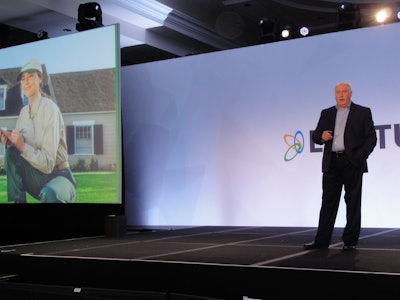 Ken DeWitt, chief information officer of TruGreen
Ken DeWitt, chief information officer of TruGreen“Over the last 16 years we have been building and deploying software that allows you to connect, optimize, and automate your local operations,” Morris told the approximately 600 attendees at the Telogis Latitude conference. “Previously you would have to go to four or five different companies to get all this stuff.”
Coming together with Verizon has made the opportunity they began 16 years ago “much bigger and easier to capture. The mountain just got easier to climb,” he stated.
A tale of transformation
A number of Telogis customers presented at its fifth-annual user conference, each with a unique story of how the technology has helped to transform their businesses.
Ken Dewitt, chief information officer of TruGreen, a lawn care service provider, described how the company implemented products in the Telogis platform in an accelerated fashion.
Deployment started in June, 2015, and will be complete for all locations and the 7,000 vehicles in the fleet by March, 2017.
“Every night we optimize over one million work orders,” said DeWitt, who explained how the process today takes about three hours to complete and is completely paperless.
The optimized routes put driver technicians at customer locations with the right side of trucks — where the hose is located — facing lawns for service.
TruGreen plans to leverage the Telogis platform to create a new customer service strategy that will deliver a similar experience as Uber, the taxi ridesharing service. On the day a TruGreen customer is scheduled for service, the customer will be able to see the name and picture of the lawn care technician, the current location and the expected time of arrival, from any connected device.
TruGreen also plans to connect to sensors on customer lawns to monitor pH levels, sprinkler control systems, and capture other data. This Internet of Things strategy will enable proactive communications and service based on need rather than fixed scheduling.
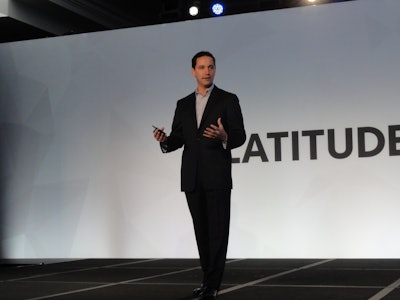 Andres Irlando, CEO of Verizon Telematics
Andres Irlando, CEO of Verizon Telematics“This sets us apart from local lawn services and keeps the customer feeling in more control of their services,” he explained.
Andres Irlando, chief executive of Verizon Telematics, told attendees why the acquisition of Telogis made sense.
Verizon has been on the leading edge of connecting vehicles for more than 20 years. About four years ago the strategy evolved from providing wireless services in connected vehicles to building and operating telematics systems, he said.
Verizon Telematics began with the purchase of Hughes Telematics. Besides acquiring Telogis, Verizon recently acquired FleetMatics for $2.4 billion but that deal has not closed yet.
Verizon is now one of leading providers of fleet management solutions, he said.
Irlando offered three reasons for the recent acquisitions: 1) to bring best-in-class platforms, technologies and solutions into the fold; 2) to expand into the enterprise space and long haul trucking sector (with Telogis); 3) and to expand Verizon’s mobile resource management offerings.
In the last six years Telogis has grown relationships with OEMs that include Volvo, Mack, Hino, Isuzu, General Motors and Nissan. It also has partnerships with OEMs for off road equipment, and at the conference announced a new relationship with John Deere and a solution that automates the ordering and replacing of parts.
As a Verizon company, Telogis now has “by far largest ecosystem of OEM partners in the industry, and we are not stopping now,” said Morris.
Large-scale BYOD
Foodservice provider Sysco, another Telogis customer, recently deployed the Telogis platform across all locations and more than 9,000 tractor trucks using Samsung tablets for the in-cab driver display.
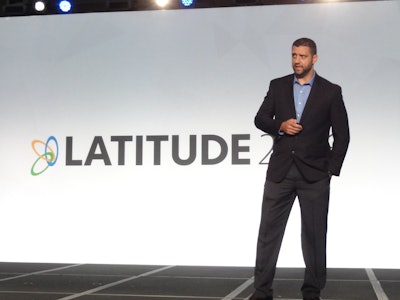 Joe Bennett, senior director of delivery and supply chain, Sysco
Joe Bennett, senior director of delivery and supply chain, SyscoThe technology has helped the company reduce delivery expense in its ever changing environment, said Joe Bennett, Sysco’s senior director, delivery and supply chain.
About 60 percent of the 9,000 trucks operated by Sysco can take advantage of a short haul exception rule in the hours-of-service regulations. With this exception, drivers do not need to take a mandatory 30-minute break in the first eight hours of driving.
Sysco uses a feature in Telogis’ suite of cloud-based routing and compliance applications that determines if drivers qualify for the exemption based on their planned routes and driving events.
The company plans to use the time savings to return drivers home or add another stop to their routes. Sysco averages 12 stops per truck, and adding one more stop to 60 percent of the trucks in its fleet is the equivalent of taking one out of 12 trucks off the road, he said.
Sysco is likewise using the Telogis platform to build a proactive customer service tool. It uses a Telogis application that calculates dynamic, real-time ETAs for each stop on a route and alerts customers via text or email if drivers are ahead or behind schedule.
The foodservice provider also uses a connectivity option from Telogis called Vehicle-as-a-Hub. This creates a secure Wi-Fi hotspot in a vehicle that connects the Telogis platform with third party applications and sensors around the vehicle. Sysco has camera and proof-of-delivery scanning systems connected to the hotspot as well as sensors for trailer temperatures, tire pressure and brakes.
“We are in a better spot today than we have ever been from a technology standpoint,” Bennett said. “We can’t wait to see what comes next.”


